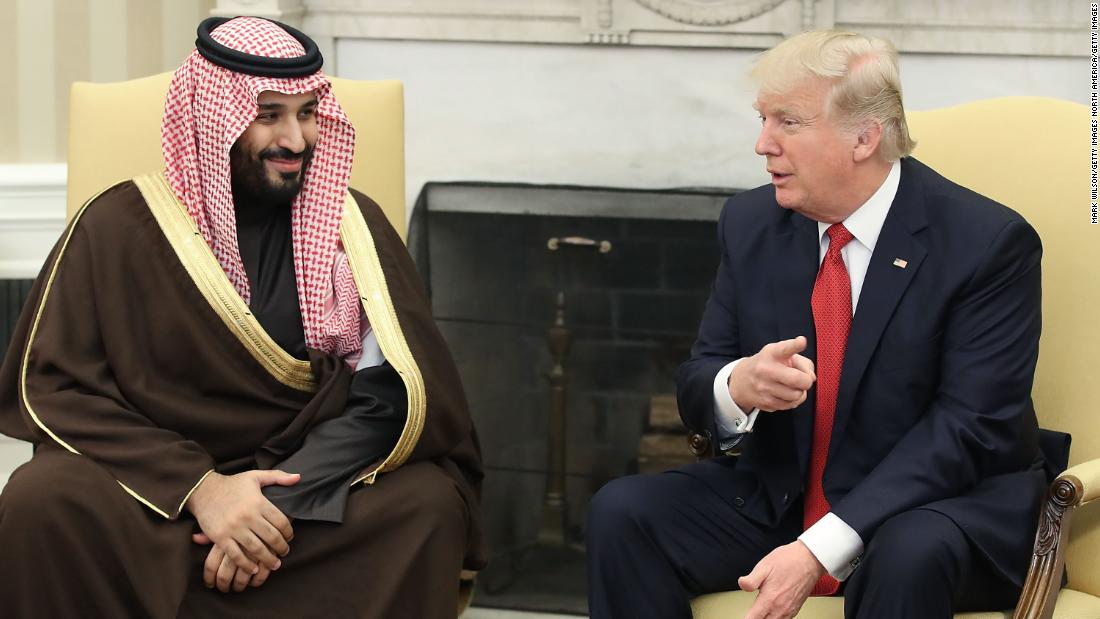(CNN)“He’s a son of a bitch, but he’s our son of a bitch.” President Franklin Delano Roosevelt is said to have been talking about Nicaraguan dictator Anastasio Somoza. It was 1939, and you can imagine him, cigarette and martini in hand, making the case for realpolitik in a world hurtling toward world war.
The downside of this dangerous temptation has reared its head again with Saudi Arabia’s brutal murder of Washington Post columnist Jamal Khashoggi, throwing the Trump administration’s Middle East strategy into chaos. But it’s always been a risky business.

Take Joseph Stalin, for starters. During the Second World War, after the bloody dissolution of the Hitler-Stalin pact, the Soviet Union was engaged in a bloody war on the eastern front as the allies focused on driving Adolf Hitler out of Western Europe. FDR was convinced he could charm the man who had already murdered millions of his own countrymen and joined naïve left-wingers in our country in calling the Soviet’s “man of steel” (a translation of “Stalin”) the decidedly more jovial “Uncle Joe.”
The alliance worked when it came to killing Hitler and his Third Reich. But then came the Yalta Conference and a too-casual carving up of the continent, which left Eastern Europe under Soviet-controlled tyranny for the next 40 years. The Cold War was on.

US backing of Cuba’s Batista created the conditions for the communist Castro regime. And these proxy wars often fueled anti-American sentiment, undercutting our vision of American exceptionalism with accusations of Yankee imperialism.
The long-standing US support of apartheid South Africa — a dependably anti-communist Western colonial power — looks inexcusable today, especially the Reagan administration’s refusal to back sanctions in the 1980s. Luckily, Nelson Mandela proved to be far wiser and embraced the United States under Bill Clinton upon his release from prison, in an effort to mend the legacy of the apartheid.
High up on the list of bad ideas in the rear-view mirror was the brief US embrace of Iraqi President Saddam Hussein. During the Iran-Iraq war, Hussein was literally the enemy of our enemy, coming just years after the hostage crisis in Iran. He was a brutal dictator but not an Islamist — a man that the US could do business with — literally.
There’s a now-infamous photo of Donald Rumsfeld — the once and future defense secretary — deferentially shaking Hussein’s hand as an envoy of then-President Reagan. Rumsfeld, of course, presided over the Pentagon during the second, massively destabilizing war with Iraq and subsequent execution of Hussein. The rise of ISIS and ongoing regional chaos is one result.

But perhaps the most brutally ironic example of this strategy was the US backing of the anti-Soviet Afghan rebels known as the mujahideen. The Carter administration directed the CIA to provide backing for the Muslim group they regarded as freedom fighters, especially after the Soviet invasion of Afghanistan.
This is more than just a cautionary tale. When past Presidents made deals with shadowy figures, they did so primarily with an eye towards the geopolitical chessboard, struggling between our ideals and realpolitik responsibilities. “Since its founding, America has tried to balance the realism of the world around it with the moralism of its founding ideals,” said Stuart Gottlieb, who teaches American foreign policy at Columbia.
“But history shows that whenever it leaned too realist, by, for example, supporting friendly dictators, or too moralist, by undercutting allies based on their human rights record, there was usually some form of blowback that sent the country back in the other direction. It’s been a tough balancing act.”

But the Trump administration went all in with the Saudis, seeing them as the key to a larger realignment within the Middle East, where that country could serve as a check on Iran and create the outlines of a new alliance for stability involving Egypt and Israel. They cozied up with the Crown Prince despite brutal treatment of his rivals, isolation of Qatar and support of a cruel war in Yemen.
This echoes a criticism of the United States often made by foreign dictators, who take issue with America’s sometimes-moralistic approach to foreign policy, seeing the US as hypocritical do-gooders — and therefore justifying their own brutality with the belief that everybody does it. In the process, claims of American exceptionalism are eroded in a sea of moral equivalence.
This ignores the many ways in which the US has been an exceptional world power, with all our imperfections. No other nation has fought foreign wars without seeking land other than to bury our dead, as is often said. That’s why the Faustian bargains we sometimes make, under the idea that “the enemy of my enemy is my friend,” do our nation reputational harm that often outweighs whatever short-term benefits they have provided. It obscures the truth that American patriotism is different from run-of-the-mill nationalism.
As a country based on an idea rather than a tribal identity, our greatest strength comes from a deeper source. As political figures from Joe Biden to Bill Clinton have pointed out, “America’s greatest strength is not the example of our power, but the power of our example.”
Read more: http://edition.cnn.com/


